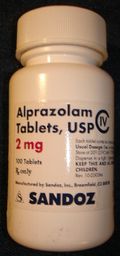|
Find information on thousands of medical conditions and prescription drugs.
|
|
|
Alprazolam
Alprazolam is a short-acting benzodiazepine used to treat anxiety disorders. It is generally sold in generic form (i.e., alprazolam) in the United States (to cut down on costs for insurance companies) and also under many other brand names, depending on the country: more...
 Home Home
 Diseases Diseases
 Medicines Medicines
 A A
 B B
 C C
 D D
 E E
 F F
 G G
 H H
 I I
 J J
 K K
 L L
 M M
 N N
 O O
 P P
 Q Q
 R R
 S S
 T T
 U U
 V V
 W W
 X X
 Alprazolam Alprazolam
 Xeloda Xeloda
 Xeloda Xeloda
 Xeneisol Xeneisol
 Xenical Xenical
 Xylazine Xylazine
 Xylocaine Xylocaine
 Xylometazoline Xylometazoline
 Xyrem Xyrem
 Y Y
 Z Z
- Xanax® - United States, Australia, United Kingdom
- Xanax XR® - (an extended release formulation) United States
- Apotex® - Canada
- Xanor® - Finland, Philippines, South Africa, Sweden
- Kalma® - Australia, New Zealand
- Ralozam® - Australia, New Zealand
- Zamhexal® - Australia
- Alplax® - Argentina
- Alviz® - Indonesia
- Alzolam® - India, Malaysia
- Alprax® - India
- Tranax® - India
- Restyl® - Bahrain, Cyprus, Egypt, Iran, Iraq, Jordan, Kuwait, Lebanon, Libya, Oman, Qatar, Republic of Yemen, Saudi Arabia, Syria, United Arab Emirates
- Tranquinal® - Ecuador, Peru
- Trankimazin® - Spain
- Tafil® - Costa Rica, Denmark, El Salvador, Germany, Guatemala, Honduras, Mexico, Nicaragua, Panama, Venezuela
- Tafil AP® - (an extended release formulation) Mexico
- Constan® - Japan
- Solanax® - Japan
- Zolarem® - Bahrain, Benin, Burkina-Faso, Cyprus, Egypt, Ethiopia, Gambia, Ghana, Guinea, Iran, Iraq, Israel, Ivory Coast, Jordan, Kenya, Kuwait, Lebanon, Liberia, Libya, Malawi, Mali, Mauritania, Mauritius, Morocco, Niger, Nigeria, Oman, Qatar, Republic of Yemen, Saudi Arabia, Senegal, Seychelles, Sierra-Leone, South Africa, Sudan, Syria, Tanzania, Tunia, Uganda, United Arab Emirates, Zambia, Zimbabwe
- Zoldac® - Benin, Burkina-Faso, Ethiopia, Gambia, Ghana, Guinea, India, Ivory Coast, Kenya, Liberia, Malawi, Mali, Mauritania, Mauritius, Morocco, Niger, Nigeria, Senegal, Seychelles, Sierra-Leone, South Africa, Sudan, Tanzania, Tunia, Uganda, Zambia, Zimbabwe
Alprazolam has a calming effect, with the most common side effects being drowsiness, clumsiness, and to a lesser extent, fatigue, and headache. It can also have more adverse effects, such as blurred vision, slurred speech or dysarthria, and changes in personality. It may be habit forming and users often develop a tolerance to its initial effects, although its anxiolytic efficacy remains intact. Physical and/or psychological dependence may develop after several weeks of alprazolam treatment. There is now a general consensus among many psychiatrists that alprazolam (a so-called 'high-potency' benzodiazepine) poses a particularly high risk for abuse and dependence. Withdrawal after long-term use should be done slowly over a period of weeks to avoid serious withdrawal symptoms such as agitation, rebound anxiety, muscle cramps and possible seizures. Some patients may benefit from a more gradual dosage reduction and/or discontinuation and substitution with diazepam.
Read more at Wikipedia.org
• [List your site here Free!]
|
|
|
|
Anti-anxiety drug may help nix heart attacks - alprazolam adds to apirin's ability to prevent blood clots
From Science News,
5/4/91
by Carol Ezzell
Alprazolam, an anti-anxiety drug sold under the trade name Xanax, may do more than just calm you. Coronary researcher John D. Folts -- whose animal experiments in the mid-1970s showed that aspirin could prevent the arterial blood clots that lead to heart attacks -- now reports animal results suggesting that alprazolam adds to aspirin's ability to stave off such clots.
In 1978, Folts and his co-workers at the University of Wisconsin-Madison, discovered that giving aspirin to dogs with narrowed coronary arteries did not prevent heart attacks if the dogs also had high blood levels of the hormone epinephrine. He found that epinephrine contributed to heart attack risk by promoting the aggregation of platelets, the blood cells that drive clotting.
Aspirin helps prevent blood clotting by binding to a specific receptor on the platelet surface. But it does nothing to reduce anxiety-driven heart attacks, because epinephrine -- the "fight-or-flight" hormone associated with anxiety -- does not act on platelets through the same receptor, Folts explains.
His team has now tested alprazolam and 10 dogs treated with aspirin for several days and then given an infusion of epinephrine. Only one dog developed clotting in the coronary arteries (coronary thrombosis), Folts reports. But when the same dogs received only aspirin before the epinephrine infusion, seven of the 10 developed the heart-threatening blood clots. Similarly, dogs given only alprazolam alone showed no reduction in coronary thrombosis.
Aspirin plus alprozolam "apparently shows complete protection" from heart-attack-causing blood clots, Folts asserts. Alprazolam's protective effect does not result solely from its mood-calming capacilities, he maintains, citing studies at the University of Texas Southern Medical Center in Dallas, in which aspirin combined with the sedative diazepam (Valium) did not ward off coronary thrombosis in patients recovering from heart attacks. Folts suggests that alprazolam acts by blocking platelet-activating factor, a clot-inducing protein produced by cells lining the blood vessels.
COPYRIGHT 1991 Science Service, Inc.
COPYRIGHT 2004 Gale Group
Return to Alprazolam
|
|




